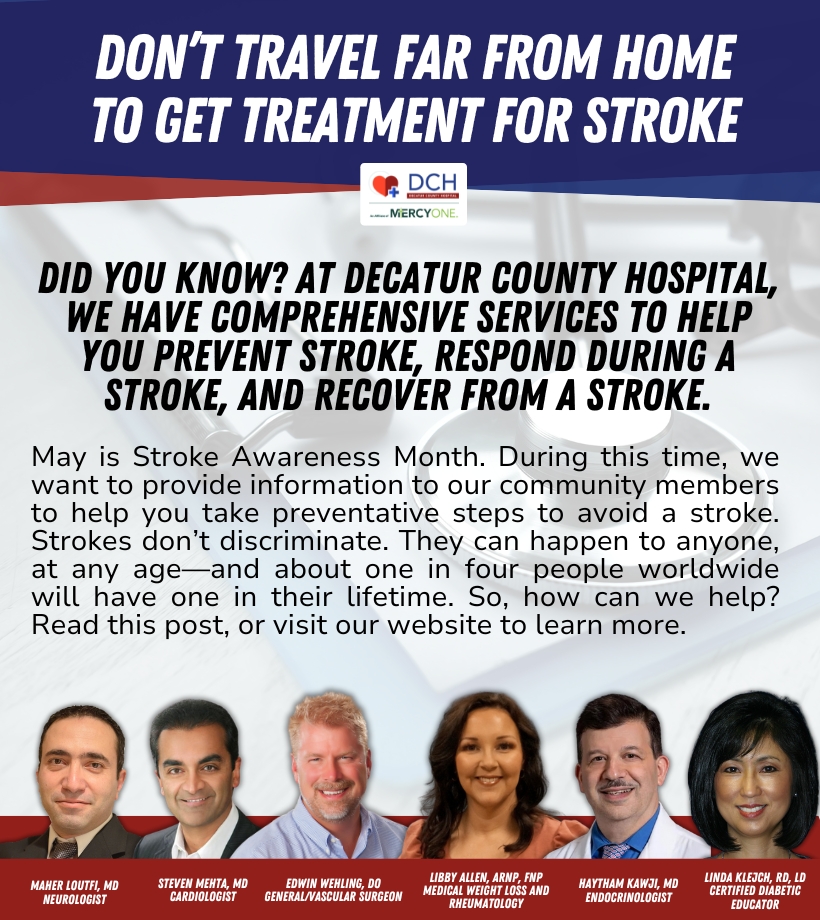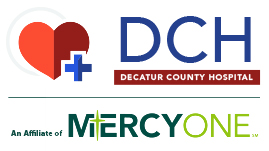Stroke Awareness Month
May 10, 2024
Did you know? At Decatur County Hospital, we have comprehensive services to help you prevent stroke, respond during a stroke, and recover from a stroke.
May is Stroke Awareness Month. During this time, we want to provide information to our community members to help you take preventative steps to avoid a stroke. Strokes don’t discriminate. They can happen to anyone, at any age—and about one in four people worldwide will have one in their lifetime. So, how can we help?
Access to a board-certified Neurologist: Dr. Mahar Loutfi, MD, provides appointments ten (10) days each month for stroke patients (and those with other neurological conditions), and additionally is available for phone consultation for emergent stroke cases. After a stroke, Dr. Loutfi can help to develop a recovery plan, and track your progress to ensure you are getting all the assistance you need.
Advanced In-House Testing: With the recent upgrade to our CT machine, the latest addition of in-house nuclear medicine, and in-house MRI coming this summer, we are able to provide a comprehensive path from diagnosis, to treatment, to recovery when you experience a stroke.
Rehabilitation: Our rehabilitation team members are specifically trained to work with patients who are recovering from or living with a neurological condition. Our therapists offer comprehensive and individual treatment plans to help you get back on your feet. Depending on your individual needs, physical therapy can help you with flexibility, balance, strength, endurance, and coordination. Our occupational therapists focus on helping people regain or learn new skills to improve their ability to function as independently as possible.
While we are here to help after a stroke occurs, we also want our community to know that stroke may be preventable. The first step is asking your doctor about which risk factors you should address.
High blood pressure is the #1 preventable risk factor for stroke. Normal blood pressure is below 120/80. If you have high blood pressure, work with your physician to reduce it. Not only may this lower your risk of stroke, it may also help your brain to function better for longer. If you live with high blood pressure and need help managing it, our board-certified interventional cardiologist, Dr. Steven Mehta is on site two (2) days each month (plus a telehealth day) to diagnose, treat, and provide guidance if you are living with a cardiac condition.
Surgical interventions may help you prevent or recover from a stroke. Our General and Vascular Surgeon, Dr. Edwin Wehling, DO, specializes in vascular surgery to address issues with your blood vessels such as blockages, plaque buildup, varicose veins, and more. Procedures available at DCH include angioplasty, plaque removal, surgical bypass for blocked vessels, hemodialysis access, ablation for varicose veins, and more. These procedures may help you prevent a blood clot that could cause a stroke, or to recover from a stroke due to a clot.
Nutrition can also be a factor in stroke risk. A diet high in saturated fat, trans fat and cholesterol can raise blood cholesterol levels. Diets high in sodium (salt) can increase blood pressure. High-calorie diets can lead to obesity. Adding color by eating lots of fruits and vegetables has been shown to lower blood pressure over time, which may help reduce your stroke risk. If you need help to manage your weight and get tips on how to adjust your diet to control your cholesterol, we’re here to help. Eighteen (18) days each month, our provider, Elizabeth “Libby” Allen, ARNP, FNP, is available to provide Medical Weight Loss services. Libby is experienced in providing individualized care to help you be successful, and to find a program that meets your needs. If you become a patient in this clinic, Libby will monitor your medical conditions along with your primary care provider, while providing guidance on medical interventions that may help you lose weight.
Having diabetes more than doubles one’s risk of stroke. Every two minutes, an adult with diabetes in the U.S. is hospitalized for stroke. Work with your doctor to manage the condition to reduce your risk of stroke. If you are living with diabetes, the experts at Decatur County Hospital are here to help you during every step in your journey. From diagnosis, to treatment, to personalized lifestyle management, our caring experts can provide the support you deserve. If you need a specialist to help you manage your diabetes, our Endocrinologist, Dr. Haytham Kawji, MD, is available to help four (4) consecutive days each month.
Certified Diabetic Education Program. Both Libby and Dr. Kawji can also provide referrals to our Certified Diabetic Educator, Linda Klejch, C.D.E., RD, LD. Linda provides personalized services to help those living with diabetes to manage their daily life. She can help with diabetes management, healthy nutrition, managing your medications, giving advice about healthy fitness activities, finding ways to reduce your risk of disease progression, utilizing equipment for glucose management (glucose meters, continuous glucose monitors, and insulin pumps), and getting access to affordable medications. All of these lifestyle adjustments may also help you lower your risk of a stroke.
If you would like to meet with any of our providers to develop a plan to reduce your stroke risk, or recover from a stroke, please call the DCH Outpatient Clinic at 641-446-2285 to schedule your appointment. Depending on your insurance, you likely do not need a referral to see our specialists.


